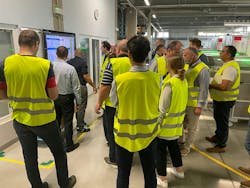Industrial training encompasses software development, cybersecurity and interdisciplinary knowledge
With the exponential advances that have occurred and continue to evolve in the sphere of controls engineering, it is natural that the training methodologies have needed an equal if not expanded system of how young controls engineers are brought up to speed in the workplace.
Educating young engineers on the integration of advanced technologies primarily involves digitalization and Industry 4.0, where training now includes skills in digital twins, Internet of Things (IoT), cloud computing, and big-data analytics, reflecting the shift toward interconnected and data-driven industrial systems.
Get your subscription to Control Design’s daily newsletter.
Following close on the heels of this are artificial intelligence (AI) and machine learning (ML), where engineers are increasingly trained in applying AI techniques for predictive analytics, optimization and autonomous control systems.
Intertwined with the above is the need for a software-centric approach: There's a greater emphasis on programming and software development skills, as control systems become more software-defined and complex. Training includes proficiency in simulation software, real-time operating systems and software tools for control design and analysis.
To be an effective controls engineer, a further requirement is the need for the acquisition of interdisciplinary knowledge. In this arena, engineers now need cross-disciplinary knowledge beyond traditional control theory, including aspects of mechanical, electrical, process and computer engineering. They are trained to understand the integration of controls with mechanical components, sensors, actuators and embedded systems.
Now that they have basically learned the trade and are ready to implement on-line control systems, the focus turns to cybersecurity. With the rise of cyber threats, training includes cybersecurity principles specific to industrial control systems (ICSs) and supervisory control and data acquisition (SCADA) systems. Many effective cybersecurity systems are in place; of these, the data-diode principle is well worth investigating.
Remote and virtual training: The COVID-19 pandemic accelerated the adoption of remote training methods, including virtual labs, online simulations and remote access to industrial equipment for practical learning. These are a massive advantage to any young aspiring controls engineer, and such opportunities should be thoroughly investigated and invested in.
That was a breakdown of the intensive knowledge-learning requirements, but there is also a solid requirement for other complementary skills, such as soft skills and collaboration. There’s a growing need for engineers to develop soft skills like teamwork, communication and project management, as they often work in multidisciplinary teams. A high degree of adaptability to rapid technological changes quite naturally is a further solid requirement. Training programs should be agile and regularly updated to keep up with the rapid pace of technological advancements in automation, AI and robotics.
Sometimes much overlooked and or maligned are the ethical considerations: With automation impacting jobs and society, engineers should be trained in ethical considerations related to automation, AI biases and the societal impacts of technology.
Furthermore, in light of the move to open systems intercommunication (OSI), good knowledge needs to be obtained in global standards and regulations: Engineers need to be aware of and compliant with international standards and regulations governing industrial automation and control systems, such as IEC 61508 and ISO 13849.
We, as humans, never stop learning. There is a strong need for continuous learning and professional development: Industrial training should support lifelong learning through professional development courses, certifications and access to cutting-edge research.
Any successful and caring controls engineer needs environmental and sustainability awareness: Training should incorporate principles of energy efficiency, sustainable design and environmental impact reduction into control system engineering practices.
Industrial training for controls engineers has shifted from a focus on traditional control theory to encompassing a broader range of skills, including software development, cybersecurity and interdisciplinary knowledge. To meet future challenges, training needs to emphasize adaptability, soft skills, ethical considerations and sustainability, while ensuring engineers stay abreast of evolving technologies and global standards. Continuous improvement in training programs will be crucial for preparing engineers to innovate and solve complex industrial automation challenges effectively.
About the Author

Charles Palmer
Charles Palmer is a process control specialist and lecturer at Charles Palmer Consulting (CPC). Contact him at [email protected].

Leaders relevant to this article:
